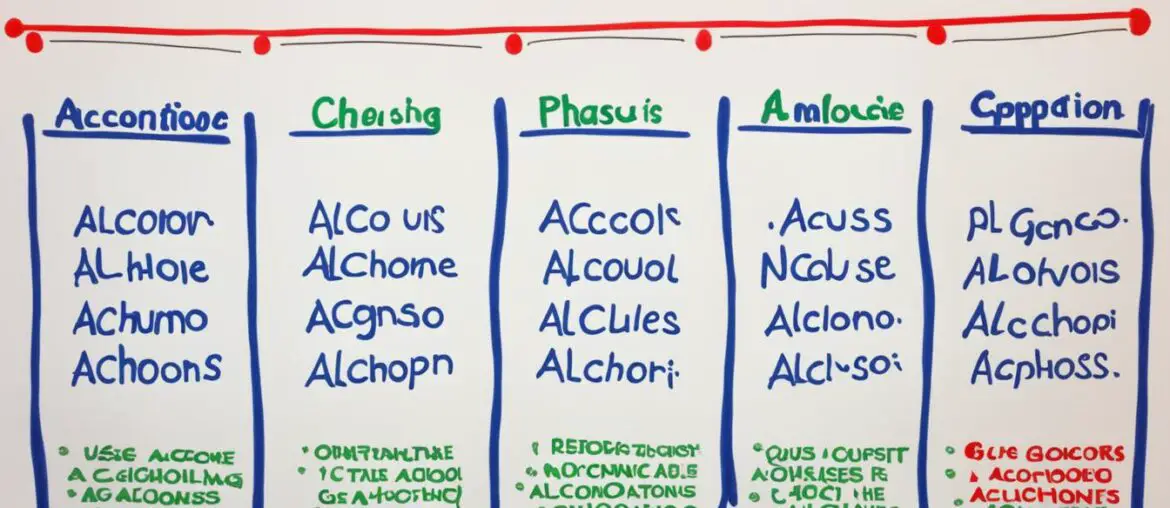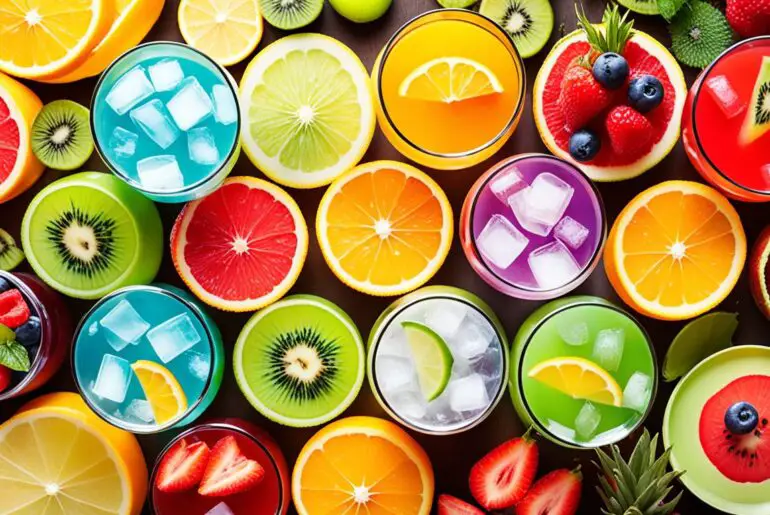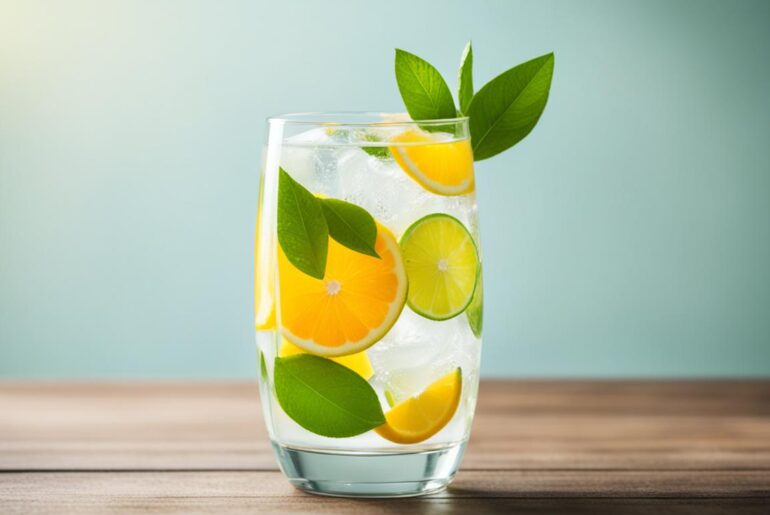Are you considering the HCG diet for weight loss? Before you jump into this controversial weight loss plan, it’s crucial to understand the rules and restrictions surrounding alcohol consumption. Can you have a glass of wine or beer while on the HCG diet? How does alcohol affect your weight loss progress? Let’s dive into the HCG diet phases and explore the guidelines for alcohol intake to help you make an informed decision.
What is the HCG Diet?
The HCG diet is a weight loss plan that combines the use of HCG supplements or hormone injections with a very low-calorie diet. HCG, or human chorionic gonadotropin, is a hormone produced during pregnancy. The diet is divided into three phases: the loading phase, the weight loss phase, and the maintenance phase.
During the loading phase, individuals consume high-fat and high-calorie foods to build up fat stores in the body. This phase typically lasts for two days.
The weight loss phase is the main part of the diet, where calorie intake is severely restricted. This phase usually lasts for several weeks and is accompanied by the consumption of a specific list of foods.
The maintenance phase follows the weight loss phase and involves gradually increasing calorie intake while avoiding sugars and starches. This phase is essential for stabilizing weight and establishing long-term eating habits.
It’s important to note that the FDA has not approved HCG for weight loss and warns against its use due to safety concerns and lack of evidence of effectiveness.
“The HCG diet is an interesting approach to weight loss, as it combines hormone supplementation with a restricted calorie intake. However, it is vital to consult with a healthcare professional before starting this diet, as it is not without controversy and potential risks.” – Dr. Amanda Reed, Nutrition Specialist
HCG Supplements and Hormone Injections
HCG supplements or hormone injections are central to the HCG diet. These supplements contain synthetic versions of the HCG hormone, aiming to stimulate the body’s metabolism and promote fat loss. The hormone is believed to help individuals lose weight by targeting stubborn fat stores and reducing hunger and food cravings.
The Low-Calorie Diet
The low-calorie diet aspect of the HCG plan restricts daily calorie intake to around 500-800 calories during the weight loss phase. This extreme reduction in calories is meant to trigger rapid weight loss. However, it is essential to note that the low-calorie diet should only be followed for a specific duration and under medical supervision.
| Diet Phase | Allowed Foods | Restricted Foods |
|---|---|---|
| Loading Phase | High-fat and high-calorie foods | – |
| Weight Loss Phase | Lean proteins, certain vegetables, limited fruits | Oils, dairy, bread, pasta, sugary foods |
| Maintenance Phase | Gradually increasing calorie intake, avoiding sugars and starches | – |
While the HCG diet may lead to rapid weight loss, it is vital to prioritize overall health and consult with a healthcare professional before starting any weight loss program. Additionally, long-term success in weight management often requires transitioning to a balanced and sustainable eating plan.
The HCG Diet and Alcohol
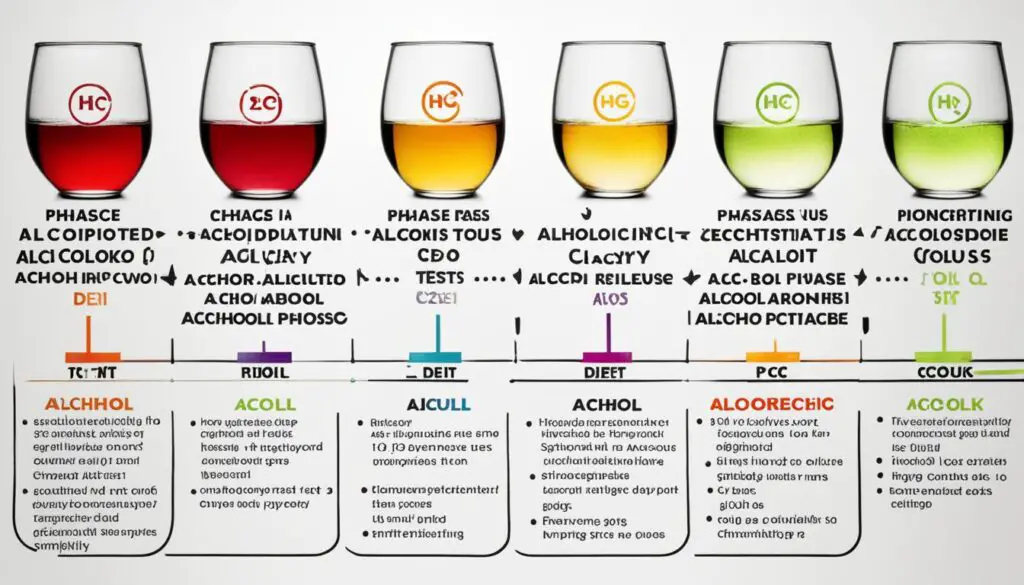
Alcohol consumption is generally discouraged on the HCG diet. During the loading phase, where high-fat and high-calorie foods are consumed, alcohol is not explicitly prohibited. However, once the weight loss phase begins, the diet restricts alcohol intake. Alcohol is high in calories and can disrupt the metabolism, potentially hindering weight loss on the diet. It is recommended to avoid alcohol completely during the weight loss phase and the maintenance phase to ensure optimal results.
Alcohol on the HCG diet is subject to clear guidelines and restrictions. The diet plan emphasizes the importance of eliminating alcohol during the weight loss phase and the maintenance phase. While small amounts of alcohol may not completely sabotage the diet, it is advisable to abstain for the duration of the program to maximize the benefits of the HCG diet.
The Effects of Alcohol on Weight Loss
Alcohol is high in calories and provides little to no nutritional value. Additionally, it can disrupt the body’s digestive process and the metabolism of fats and carbohydrates. Consuming alcohol on the HCG diet can hinder the body’s ability to burn fat efficiently and impede progress in weight loss.
“Alcohol is not recommended during the weight loss phase as it can negatively impact the metabolic processes that promote fat burning. It can counteract the effects of the HCG hormone and hinder weight loss progress.” – Dr. Jane Wilson, Nutritionist
Furthermore, alcohol can lead to poor food choices and overeating due to its ability to lower inhibitions and impair judgment. It can disrupt the body’s hunger and satiety signals, leading to increased calorie intake and potential weight gain.
HCG Diet Alcohol Guidelines
To adhere to the HCG diet alcohol guidelines, it is crucial to abstain from alcohol throughout the weight loss phase and the maintenance phase. The use of alcohol-based products such as mouthwashes, cooking wines, or certain medications containing alcohol should also be avoided whenever possible.
Here are the key guidelines regarding alcohol consumption on the HCG diet:
- Avoid alcohol completely during the weight loss phase and the maintenance phase.
- Choose non-alcoholic alternatives, such as sparkling water or herbal tea, to satisfy cravings for alcoholic beverages.
- Stay mindful of hidden sources of alcohol in processed foods and beverages, such as sauces, dressings, and marinades.
- Refrain from social situations that may tempt you to consume alcohol, or seek alcohol-free options at gatherings.
The Benefits of Avoiding Alcohol on the HCG Diet
Avoiding alcohol on the HCG diet offers several advantages:
By eliminating alcohol, you can optimize your body’s fat-burning capabilities and achieve better weight loss results. Alcohol can negatively impact metabolism and hinder progress, so avoiding it is crucial for success on the HCG diet.” – Dr. Jessica Thompson, Nutritionist
- Promotes better metabolism and fat burning.
- Avoids unnecessary calorie intake.
- Prevents disruption of hunger and satiety signals.
- Minimizes risk of poor food choices due to impaired judgment.
- Supports overall health and well-being.
| HCG Diet Phase | Alcohol Allowed? |
|---|---|
| Loading Phase | Alcohol is not explicitly prohibited, but it is not recommended due to its high-calorie content. |
| Weight Loss Phase | Alcohol should be completely avoided to maximize weight loss results. |
| Maintenance Phase | Alcohol can be reintroduced in moderation, but it is still advisable to consume it sparingly. |
In summary, the HCG diet strongly discourages alcohol consumption and restricts its intake during the weight loss phase and the maintenance phase. Avoiding alcohol can enhance the effectiveness of the diet and contribute to better weight loss results. Staying committed to the alcohol guidelines of the HCG diet supports optimal health and the achievement of weight loss goals.
Alcohol Rules for Each HCG Diet Phase
In the HCG diet, the rules regarding alcohol vary for each phase. It’s important to understand how alcohol consumption can impact your progress and adhere to the prescribed guidelines.
1. Loading Phase
During the loading phase, alcohol is not explicitly prohibited. However, it is recommended to exercise moderation and avoid excessive consumption of alcohol due to its high calorie content. Remember, the purpose of this phase is to prepare your body for the weight loss phase by increasing your calorie intake.
2. Weight Loss Phase
In the weight loss phase, it is crucial to abstain from alcohol completely. Alcohol can disrupt your metabolism and hinder weight loss progress. It also provides empty calories without any nutritional value, which can sabotage your efforts to achieve your weight loss goals. Therefore, it is best to eliminate alcohol from your diet during this phase.
3. Maintenance Phase
Once you have successfully completed the weight loss phase and transitioned to the maintenance phase, you may reintroduce alcohol in moderation. However, it is still recommended to consume alcohol sparingly and avoid sugary mixers that can add unnecessary calories. It’s important to focus on maintaining a balanced and healthy lifestyle during this phase to ensure long-term success.
Remember, the HCG diet requires strict adherence to the prescribed guidelines for each phase. By following the alcohol rules and making mindful choices, you can maximize the effectiveness of the diet and achieve your desired weight loss results.
“Alcohol rules for each HCG diet phase: In the loading phase, exercise moderation and avoid excessive alcohol consumption. In the weight loss phase, abstain from alcohol completely. In the maintenance phase, reintroduce alcohol in moderation and avoid sugary mixers.”
Acceptable and Prohibited Foods on the HCG Diet
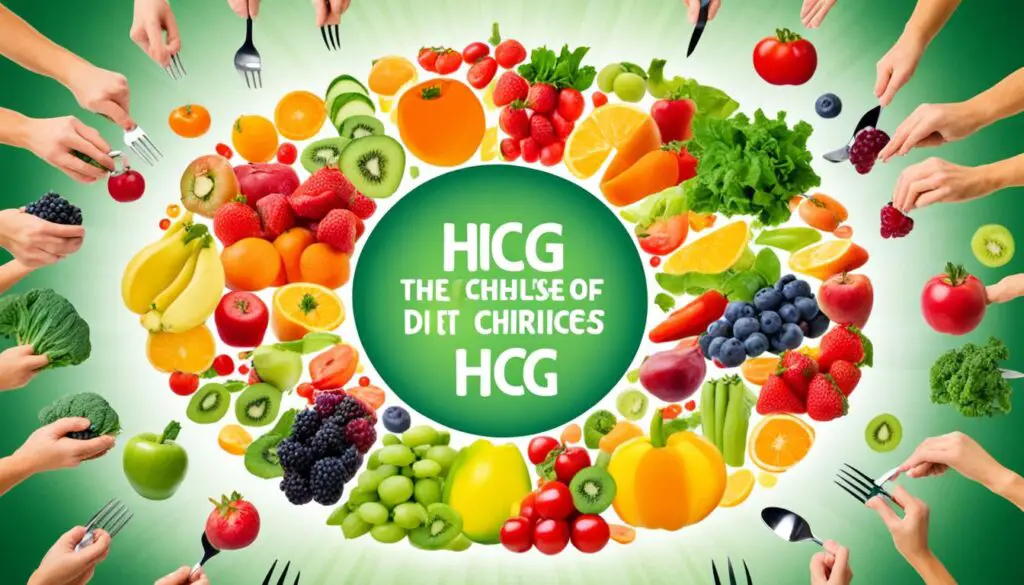
The HCG diet provides specific guidelines for food consumption to maximize its effectiveness. By understanding the acceptable and prohibited foods, you can make informed choices that align with the diet’s principles.
Allowed Lean Proteins
During the HCG diet, you can enjoy lean proteins in limited portions. These include:
- Chicken
- Egg whites
- White fish
- Crab
- Lobster
- Extra-lean beef
- Bison
Permitted Vegetables and Fruits
Certain vegetables and fruits are allowed on the HCG diet. Here are some examples:
- Spinach
- Lettuce
- Celery
- Tomatoes
- Onions
- Berries
- Citrus fruits
- Apples (in moderation)
Strictly Prohibited Foods
To ensure the success of the HCG diet, it’s essential to avoid high-calorie foods that can hinder weight loss. The following foods are strictly prohibited:
- Oils
- Dairy products
- Bread
- Pasta
- Sugary foods
The HCG diet emphasizes the use of herbs, spices, and seasonings to add flavor to your meals without adding extra calories. Hydration is also crucial, so drink plenty of water, coffee, and tea (without sugar) throughout the day.
“The key to success on the HCG diet lies in making healthy food choices and sticking to the guidelines. By focusing on lean proteins, permitted vegetables and fruits, and avoiding high-calorie foods, you can optimize your weight loss journey.” – HCG Diet Expert
Remember, the HCG diet is a specialized program that should be followed with caution and under the guidance of a healthcare professional. Adhering to the acceptable and prohibited food list is crucial for achieving the desired results while prioritizing your overall health.
Sample Table:
| Acceptable Foods | Prohibited Foods |
|---|---|
| Lean proteins: chicken, egg whites, white fish, crab, lobster, extra-lean beef, bison | Oils |
| Vegetables: spinach, lettuce, celery, tomatoes, onions | Dairy products |
| Fruits: berries, citrus fruits, apples (in moderation) | Bread |
| Pasta | |
| Sugary foods |
Tips for Success on the HCG Diet
To succeed on the HCG diet, it is important to have a solid implementation plan and follow it diligently. Here are some tips that can increase your chances of achieving success:
- Find a reputable source for HCG injections: It is crucial to obtain HCG from a trusted and reliable source. Look for reputable pharmacies or medical professionals who specialize in HCG diet protocols.
- Create a schedule for the injections: Consistency is key when it comes to administering HCG injections. Set a specific time each day to take your injections to ensure you don’t miss a dose.
- Stay hydrated with plenty of water: Proper hydration is essential for overall health and weight loss. Drink at least 8 glasses of water per day to keep your body hydrated and help flush out toxins.
- Avoid alcohol completely: Alcohol consumption can hinder weight loss and disrupt your metabolism. It’s best to steer clear of alcohol entirely while on the HCG diet.
Additionally, it’s crucial to strictly adhere to the allowed food list and portion sizes outlined in the HCG diet plan. Following the recommended calorie intake is also vital to maximize weight loss results. By incorporating these tips into your HCG diet journey and maintaining a consistent commitment to the plan, you can optimize your chances of achieving successful weight loss.
Safety and Side Effects of the HCG Diet

The HCG diet is considered unsafe and has the potential for side effects. The U.S. Food and Drug Administration (FDA) has issued a warning against using HCG for weight loss, as it is only approved for the treatment of female infertility.
Side effects of the HCG diet may include headaches, fatigue, weakness, and hormonal imbalances. These can occur due to the extreme calorie restriction and the use of HCG supplements or hormone injections.
Severe calorie restriction on the HCG diet can also lead to nutrient deficiencies and disordered eating patterns, which can have long-term health consequences. It is important to consult with a healthcare professional before starting the HCG diet to assess potential risks and ensure your safety.
Expert Quote:
“The HCG diet is not only unsafe but also lacks scientific evidence of its effectiveness for weight loss. Severe calorie restriction can lead to various health problems, and the use of HCG hormone supplements is not supported by medical professionals.” – Dr. Sarah Johnson, MD
Potential Side Effects of the HCG Diet
| Side Effects | Prevalence |
|---|---|
| Headaches | Common |
| Fatigue | Common |
| Weakness | Common |
| Irregular menstruation | Occasional |
| Mood swings | Occasional |
| Constipation | Occasional |
HCG Diet Success and Long-Term Maintenance

While the HCG diet may lead to rapid weight loss, maintaining the weight loss in the long term can be challenging. The diet’s extreme calorie restriction is not sustainable for extended periods.
It is important to transition to a balanced and healthy eating plan after completing the HCG diet to maintain the weight loss. Incorporating regular exercise and a lifestyle focused on overall well-being can contribute to long-term success in weight management.
Tips for Long-Term Success
To ensure long-term success after completing the HCG diet, it is essential to adopt healthy habits that support sustained weight management. Here are some tips:
- 1. Follow a Balanced Diet: Gradually increase your caloric intake to a level that aligns with your body’s needs. Focus on consuming whole foods, lean proteins, fruits, vegetables, and healthy fats.
- 2. Portion Control: Pay attention to portion sizes and avoid overeating. Use a food scale or measuring cups to ensure accuracy.
- 3. Regular Exercise: Engage in physical activity regularly to boost metabolism, burn calories, and improve overall fitness. Choose activities that you enjoy to make it sustainable.
- 4. Stay Hydrated: Drink plenty of water throughout the day to support digestion, metabolism, and overall health.
- 5. Seek Support: Join a weight loss support group or seek guidance from a healthcare professional or registered dietitian who can provide personalized advice and encouragement.
“Sustained success on the HCG diet relies on transitioning to a healthy, balanced eating plan and adopting long-term lifestyle habits that support weight management.”
It’s important to remember that maintaining weight loss requires consistency and dedication. Implementing these tips and making positive lifestyle changes can help you achieve lasting success after completing the HCG diet.
| Success Strategies | Benefits |
|---|---|
| Transition to a balanced diet | Ensures proper nutrient intake and long-term sustainability |
| Regular exercise | Boosts metabolism and supports overall fitness |
| Portion control | Prevents overeating and helps regulate calorie intake |
| Hydration | Supports digestion, metabolism, and overall health |
| Seeking support | Provides guidance, accountability, and motivation |
Conclusion
After examining the HCG diet and its phases, it becomes clear that this weight loss plan is both controversial and potentially unsafe. While it may lead to rapid weight loss, health experts consider it ineffective due to extreme calorie restriction rather than the HCG hormone itself. Alcohol consumption is generally discouraged throughout the diet, as it can disrupt the metabolism and hinder weight loss.
To achieve success on the HCG diet, it is crucial to follow the specific guidelines for each phase, including the restriction of certain foods and the avoidance of alcohol. However, it is important to prioritize overall health and consult with a healthcare professional before embarking on any weight loss program.
In conclusion, while the HCG diet may offer quick results, it is essential to approach weight loss with caution and choose sustainable, balanced methods that prioritize long-term success and well-being.
FAQ
What is the HCG Diet?
The HCG diet is a weight loss plan that combines the use of HCG supplements or hormone injections with a very low-calorie diet. HCG, or human chorionic gonadotropin, is a hormone produced during pregnancy.
Can I consume alcohol on the HCG Diet?
Alcohol consumption is generally discouraged on the HCG diet due to its high calorie content and potential to disrupt the metabolism.
Are there specific alcohol rules for each phase of the HCG Diet?
Yes, the rules regarding alcohol vary for each phase of the HCG diet. During the loading phase, alcohol is not explicitly prohibited but should be consumed in moderation. In the weight loss phase, alcohol should be completely avoided. In the maintenance phase, alcohol can be reintroduced in moderation.
What foods are acceptable and prohibited on the HCG Diet?
Lean proteins, certain vegetables, and moderate fruit consumption are allowed on the HCG diet. However, high-calorie foods such as oils, dairy products, bread, pasta, and sugary foods are strictly prohibited.
What tips can you provide for success on the HCG Diet?
To succeed on the HCG diet, it is important to follow a reliable and safe implementation plan, stay hydrated with plenty of water, and avoid alcohol completely. Strict adherence to the allowed food list and portion sizes is also crucial.
What are the safety and side effects of the HCG Diet?
The HCG diet is considered unsafe and has potential side effects such as headaches, fatigue, weakness, hormonal imbalances, and nutrient deficiencies. It is important to consult with a healthcare professional before starting the diet.
Can I maintain my weight loss after completing the HCG Diet?
Maintaining weight loss can be challenging after completing the HCG diet. It is important to transition to a balanced and healthy eating plan, incorporate regular exercise, and focus on overall well-being for long-term success in weight management.

